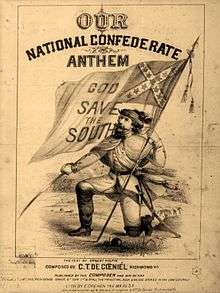God Save the South
"God Save the South" is a poem-turned-song written by American George Henry Miles, under the pen name Earnest Halphin, in 1861. It is considered by some to have been the unofficial national anthem of the Confederate States of America.[1] The commonly heard version was composed by Charles W. A. Ellerbrock, while C. T. De Cœniél later composed a different tune for the song.
 A rare music cover illustration, published by the composer, C. T. De Cœniél, in Richmond, Virginia | |
Unofficial national anthem of | |
| Lyrics | Earnest Halphin, 1861 |
|---|---|
| Music | Charles W. A. Ellerbrock |
History
"God Save The South" was written in 1861 by Miles as Ernest Halphim[2] with the music for it being composed by Charles Wolfgang Amadeus Ellerbrock. Halphim wrote it with the intent to inspire Confederate soldiers during the American Civil War that God would be with them. It was also written as an intent to counter the Union's usage of the newly-written "Battle Hymn of the Republic" as a rallying hymn.[3] It was also used as a way to develop a unique Southern national culture to distinguish the Confederate States from the United States.[4] When it was published in New Orleans, it was the first song published in the Confederate States since the Ordinance of Secession.[1] The hymn was later included in the Confederate hymnal, The Soldier's Companion given to all Confederate soldiers during the war.[5]
"God Save The South" is considered as the national anthem for the Confederate States and was published in Virginia with the subtitle of "Our national Confederate anthem" with the image of a Confederate soldier carrying the Stainless Banner with "God Save The South" on it.[6][7] However, "Dixie" was popular amongst Confederate soldiers and citizens and thus was a marching song and parade song of Confederate troops. However, in 1950 Richard Harwell wrote: "[Dixie] can hardly be said to meet the requirements of a national anthem, [although] it has become a truly national tune, permanently enshrined in the hearts of Americans in both the North and the South. That honor rightly belongs to 'God Save the South' not just by virtue of its status as the new nation's first published song but also because of its stirring poetry and its outstanding musical setting."[8]
Composition
While the anthem mostly used Ellerbrock's music, it was also set to the tune of the British national anthem, "God Save the Queen".[9] Because of this association, as well as a perceived lack of originality, “God Save the South” was criticized in Southern Punch, a weekly periodical modeled after Britain’s Punch.[10][11] C. T. De Cœniél also wrote another tune for "God Save the South" after Ellerbrock's original, which gained popularity at the time.[7]
The fifth verse has been used by one writer as an example of the citizens of the Confederacy's perceived affiliation with George Washington, as he was also considered to be a rebel during the American War of Independence.[1]
References
- "Civil War Music: God Save the South". Civilwar.org. Archived from the original on 2010-10-26. Retrieved 2016-07-08.
- "God save the south!". Library of Congress. Retrieved 2016-07-08.
- Hilton, Don (2012). Murders, Mysteries and History of Crawford County, Pennsylvania 1800–1956. AuthorHouse. p. 53. ISBN 1477266151.
- Guezlo, Allen (2012). Fateful Lightning: A New History of the Civil War and Reconstruction. Oxford University Press. p. 411. ISBN 0199939365.
- Sundquist, Eric (2009). King's Dream. Yale University Press. p. 176. ISBN 0300142447.
- "Our national Confederate anthem". Library of Congress. Retrieved 2016-07-08.
- "Confederate States of America –". Nationalanthems.info. Retrieved 2016-07-08.
- Harwell, Richard (1950). Confederate Music. University of North Carolina Press. p. 63.
- Cliffe, Peter (8 September 2006). "North and South Had Songs of Pride, Sorrow". The Washington Times. Retrieved 2016-07-20.
- Bernath, Michael (2010). Confederate Minds: The Struggle for Intellectual Independence in the Civil War South. University of North Carolina Press. p. 231. ISBN 0807833916.
- Nickels, Cameron C. (2011-02-03). Civil War Humor. Univ. Press of Mississippi. ISBN 978-1-62846-791-8.CS1 maint: date and year (link)